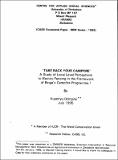| dc.contributor.author | Dzingirai, Vupenyu. | |
| dc.coverage.spatial | Zimbabwe | en_GB |
| dc.date.accessioned | 2014-10-03T10:50:35Z | |
| dc.date.available | 2014-10-03T10:50:35Z | |
| dc.date.issued | 2014-10-03 | |
| dc.identifier.uri | https://opendocs.ids.ac.uk/opendocs/handle/20.500.12413/4638 | |
| dc.description | This paper was presented at a ZIMWESI Workshop, Extension Intervention in Resource Management: New Perspectives on Agricultural Innovation in Zimbabwe held between 10-12th January, 1995, at Mandel Training Centre. | en_GB |
| dc.description.abstract | Today it is generally accepted that wildlife can be fully conserved by involving local' people in its management (Bromley and Carnea, 1989: 10; Berkes and Farvar, 1989: 3). The argument is that benefits to the people who live with the resources will give value to wildlife. Local people will also start to regard wildlife as their own and, because of that, will stop poaching them. (Murpnree, 1991; Makombe, 1993). | en_GB |
| dc.language.iso | en | en_GB |
| dc.relation.ispartofseries | CASS Occasional Paper - NRM Series;1995; | |
| dc.rights.uri | http://creativecommons.org/licenses/by-nc-nd/3.0/ | en_GB |
| dc.subject | Environment | en_GB |
| dc.subject | Participation | en_GB |
| dc.subject | Rural Development | en_GB |
| dc.subject | Technology | en_GB |
| dc.title | 'Take Back Your Campfire’: A Study of Local Level Perceptions to Electric Fencing in the Framework of Binga’s Campfire Programme | en_GB |
| dc.type | Series paper (non-IDS) | en_GB |
| dc.rights.holder | University of Zimbabwe | en_GB |


